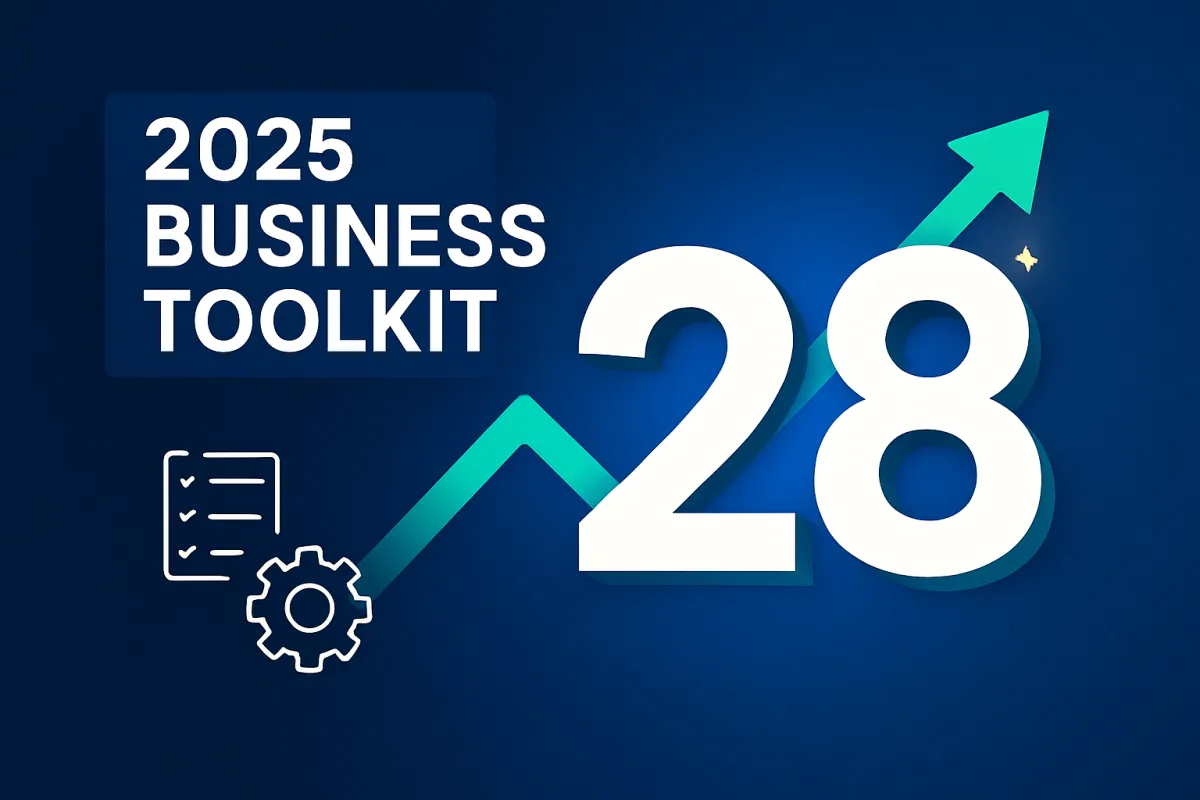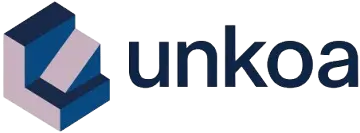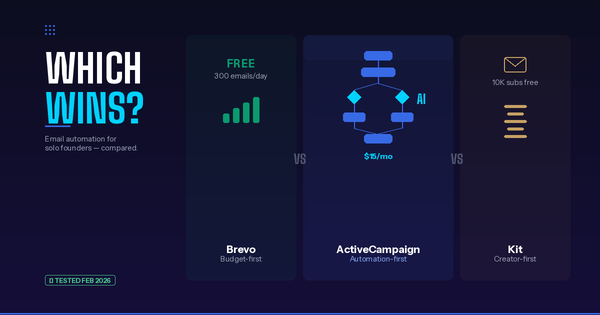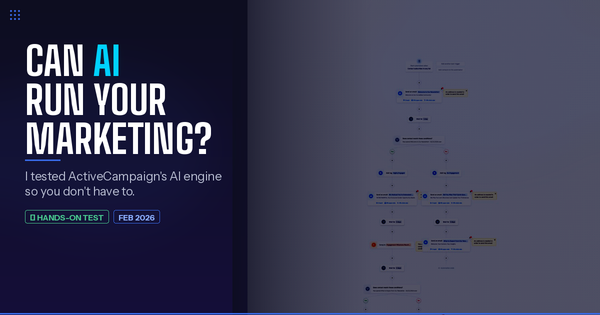28 Essential Tools to Grow Your Business in 2025 (Ultimate Guide)
The ultimate 2025 business toolkit: 28 apps for productivity, marketing, AI, web, and operations to help you work faster, win more customers, and scale with confidence.

In 2025, the right software stack isn't just "nice to have." It's the difference between spinning your wheels and growing efficiently. The global market for productivity software alone was worth roughly $60 billion in 2023 (Sensor Tower), which shows how vital these tools have become for businesses of all sizes.
Almost every small or mid-sized business now uses at least one digital tool, and most report that these solutions help them innovate and work more effectively (Altamira).
Whether you're a solo entrepreneur or running a growing team, the 28 tools below can make work less chaotic, keep customers happy, and help you scale without adding unnecessary overhead.
To keep things practical, we'll cover tools across five categories – Productivity, Marketing, Content & AI, Websites & E-commerce, and Operations – ending with a case study of a startup that saved six figures just by choosing wisely.
Productivity & Collaboration Tools
These tools help you stay organized and get your team working in sync.
- Todoist – A clean and simple task manager. Think deadlines, recurring tasks, shared project lists, and offline access across devices. Perfect when sticky notes just aren't cutting it.
- Notion – Instead of juggling five different apps, Notion gives you docs, wikis, tasks, and databases in one workspace. Great for organizing knowledge and collaborating on projects without chaos.
- Fathom – An AI meeting assistant that records, transcribes, and summarizes Zoom/Meet/Teams calls. You talk. It takes the notes. No more scrambling afterward.
Marketing & Sales Tools
Keeping pipelines full and customers engaged is tough without automation and data. These apps lighten the load.
- ManyChat – Build chat automations for Instagram, Facebook Messenger, WhatsApp, and SMS. Use it to respond faster, capture leads, and nurture customers without writing code.
- Brevo – Email and SMS marketing plus an easy-to-use CRM. It helps you segment, automate, and track results all in one place.
- SocialBee – Plan and schedule social content across multiple platforms. Add categories, approvals, and analytics to stay consistent without burning out.
- Apollo – A powerhouse for B2B sales intelligence. Access millions of verified contacts, enrich data, and run automated multi-channel outreach.
- PhantomBuster – Automates prospecting and scraping across LinkedIn, Instagram, and more. Built-in "Phantoms" save you from repetitive lead-gen tasks.
- AiSDR – An AI assistant for outbound sales that drafts and sends personalized cold emails and LinkedIn messages at scale.
- NiceJob – Automates customer review requests and showcases them on your website to boost local SEO and conversions.
- Snapchat For Business – If your audience skews Gen Z or millennial, Snapchat ads (including AR lenses and vertical video) can be a cost-effective way to reach them.
Content Creation & AI Tools
Marketing today is media-heavy. These tools cut the time it takes to create content people actually engage with.
- QuillBot – An AI writing assistant that helps with paraphrasing, summarizing, grammar, and quick rewrites for fresh variations.
- Frase – Research and optimize content for SEO by pulling real-time data from top-ranking pages. It also scores your drafts against competitors.
- Murf.ai – Text-to-speech that doesn't sound robotic. Over 120 voices in multiple languages, with controls to fine-tune tone and pacing.
- ElevenLabs – Ultra-realistic voice synthesis, including voice cloning (with consent). Great for e-learning, training, or character voices.
- Opus Clip – Automatically finds the best clips from long videos and formats them for TikTok, Reels, and YouTube Shorts.
- Pikzels – Generate custom thumbnails and images for YouTube and social media. It can even swap faces and test multiple titles to increase clicks.
Website & E-Commerce Tools
These platforms help you sell online, whether it's physical products, services, or digital goods.
- Shopify – The go-to e-commerce platform. Handles design, checkout, payments, shipping, and more. Reliable and scalable.
- Webflow – A no-code website builder that outputs clean code. Build custom, responsive sites with full CMS control.
- Leadpages – Launch high-converting landing pages fast with templates, pop-ups, and alert bars. Handy for campaigns and quick tests.
- Unbounce – Optimized for conversion. Includes advanced A/B testing and Smart Traffic that automatically directs visitors to the version most likely to convert.
- Stan Store – Ideal for creators. A link-in-bio storefront where you can sell digital downloads, coaching, or subscriptions without paying commissions.
Operations, HR & Finance Tools
Behind-the-scenes processes can make or break scalability. These tools keep admin work under control.
- Deel – Hire and pay international workers without dealing with foreign legal entities. Payroll, compliance, and contracts in one dashboard.
- SignNow – Streamlined e-signatures and document management. Close deals faster without paper or endless scanning.
- airSlate – Workflow automation for documents. Connect forms, approvals, and apps so data moves without manual mistakes.
- Xero – Small business accounting software that syncs with your bank, handles invoices, payroll, and makes collaboration with your bookkeeper simple.
- Aircall – Cloud phone system with call routing, recordings, and CRM integrations. Set up a professional phone presence quickly.
- Fiverr – A massive freelance marketplace. Tap into writers, designers, developers, or marketers as needed without fixed overhead.
Case Study: How AgentSea Saved $120K Per Year
A good example of tool selection paying off is AgentSea, an AI startup scaling across Asia and the U.S.
Instead of building HR departments in each region, they used Deel to onboard employees in a single day, unify payroll, and stay compliant. That switch cut the need for multiple full-time HR hires and saved them between $120,000 and $140,000 annually.
As Fatima Rizwan from AgentSea put it, the big win wasn't just the savings but the freedom to expand quickly without compliance headaches.
FAQs
Q1. How do I choose which tools my business actually needs?
Start with your biggest pain points. If projects feel disorganized, start with a project planner. If marketing reach is lagging, focus on email and social tools. Trial a few, see what sticks, and double down where impact is clear.
Q2. Are these tools beginner-friendly and do they offer free versions?
Most are built for non-technical users, and many offer free plans or trials. Start small, validate value, upgrade later.
Q3. Can these different tools integrate with each other?
Yes. Many connect natively and the rest can be linked through automation tools like Zapier or Make.
Q4. How secure are these tools for my business data?
Established SaaS apps use encryption and submit to audits. Many comply with SOC 2 and GDPR. Always enable 2FA and check each vendor's security settings.
Q5. What ROI can I expect – are they worth the cost?
ROI comes from time saved, revenue gained, and costs avoided. For example, AgentSea saved six figures by not hiring dedicated HR staff. Use before/after tracking on key metrics such as hours saved, leads generated, or invoices paid faster.
Citations
- Productivity software market estimated at $60B in 2023: Sensor Tower
- Nearly all SMBs now use digital tools, most say they improve efficiency: Altamira
- AgentSea case study: Deel





